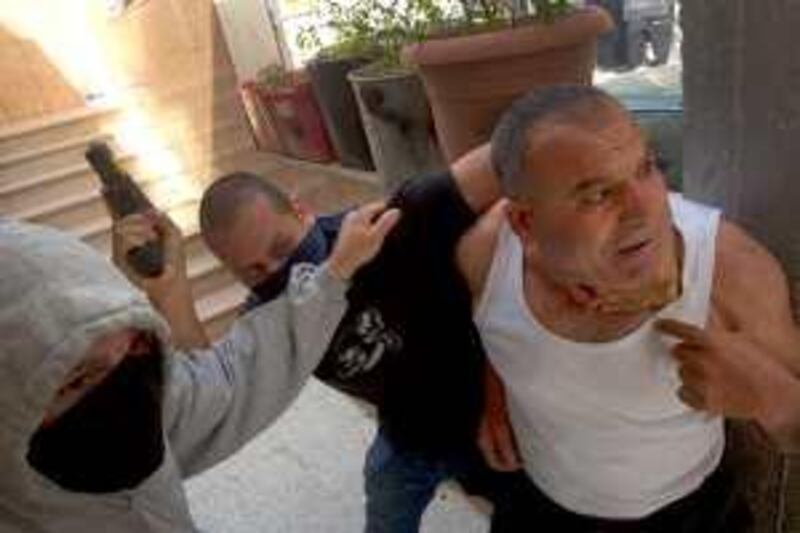TEL AVIV // George Mitchell, the top US envoy to the Middle East, yesterday met Israeli and Palestinian leaders in a bid to advance Washington's efforts to reignite negotiations even amid increasingly grim prospects for peace. A day after Israel's ultranationalist foreign minister declared there was no chance for a peace deal any time soon, Mr Mitchell met with Benjamin Netanyahu, the Israeli prime minister, in Jerusalem in a renewed attempt to convince him to make the concessions necessary for the two sides to resume peace talks.
A statement from Mr Netanyahu's office described the two-hour meeting as "constructive" and added that it focused "on steps for advancing the peace process". Mr Mitchell and his aides are due to continue the talks today with representatives of Mr Netanyahu. While the statement provided no indication of any possible breakthroughs, Israeli media reported that no announcement on renewed negotiations is expected when Mr Mitchell concludes his latest regional tour tomorrow.
Mr Mitchell, who opted to make no comment following his discussion with the Israeli premier, said on Thursday in Tel Aviv that Washington recognises "the complexities and the difficulties" but remains confident of reaching its goal for regional peace. The US envoy met yesterday evening in the West Bank city of Ramallah with Mahmoud Abbas, the president of the western-backed Palestinian Authority.
Underlining the tinderbox nature of Palestinian-Israeli relations, Mr Mitchell's meetings coincided with demonstrations that broke out in both the Hamas-ruled Gaza Strip and in the West Bank, dominated by Mr Abbas's Fatah movement, to protest against Israel's recent restrictions on access to the al Aqsa mosque in the Old City of Jerusalem. At the end of prayers yesterday, violent clashes erupted between dozens of Palestinians and Israeli soldiers and police in East Jerusalem's neighbourhoods and eyewitnesses said that Israeli soldiers used tear-gas canisters and rubber bullets to disperse the demonstrators.
Mr Mitchell is under pressure to deliver results ahead of a progress report on the talks that Hillary Clinton, the US secretary of state, is due to hand to Barack Obama, the US president, next week. His last Middle East visit three weeks ago ended with a failure to persuade Mr Netanyahu, who heads a predominantly right-wing, pro-settler governing coalition, to agree to freeze all Jewish construction in occupied territory that Palestinians want as part of their future state.
A key obstacle to the two sides returning to the negotiations table is the growing calls for Mr Abbas to resign. Mr Abbas, viewed by the West as the best candidate to clinch a peace deal with Israel, is under fire at home for backing a delay for taking action on a damning United Nations report alleging Israeli war crimes in the country's attacks in the Gaza Strip in December and January. He has also been condemned for attending the tripartite meeting in New York with Mr Netanyahu and Mr Obama in late September without having his precondition of an Israeli settlement freeze met.
The Palestinian leader may get some help from Israel. Haaretz, a liberal Israeli newspaper, cited an unidentified senior Israeli official yesterday as saying that Mr Netanyahu is preparing a package of goodwill gestures to bolster Mr Abbas's standing among Palestinians and that he may have announced the overtures during his meeting with Mr Mitchell. The report said the measures being considered include authorisation for setting up a second cellular telephone network in the occupied West Bank and releasing the necessary frequency for use by the Palestinian Authority. Other measures may include agreeing to a Palestinian request for building a new city near Ramallah.
However, such moves are unlikely to restore popular support for Mr Abbas. The criticism he is facing may also prompt a delay of a long-awaited reconciliation agreement between Mr Abbas's secular Fatah movement, which holds sway in the West Bank, and Hamas, an Islamic group that rules Gaza after routing forces loyal to Fatah in 2007. The pact was expected to help unite the split Palestinian national movement and is viewed as a key step towards negotiating with Israel on a Palestinian state that would include the West Bank and Gaza with East Jerusalem as its capital.
On Thursday, newswires cited unidentified Hamas officials as saying that they have asked Egypt, which is brokering the talks, to postpone the pact-signing ceremony that was scheduled for late October. However, it remains unclear whether the meeting, which has been delayed several times in recent months, may be further put off. Riad Malki, the Palestinian Authority's foreign minister, told reporters in New York on Thursday after meeting with Ban Ki-moon, the UN secretary general, that an agreement was near. He said: "We hope [the reconciliation] will open a new chapter in the Palestinian movement. We are ready to sign whenever the document is ready."
But even Mr Malki suggested that the agreement may not mean that the deep divisions between Fatah and Hamas are resolved as he added: "When you look more deeply at the details, we discover that we are far apart on issues." Reaching a pact with Hamas could help boost Mr Abbas at a critical time, several months ahead of possible Palestinian presidential and parliamentary elections that according to media reports may take place in the first half of 2010.
@Email:vbekker@thenational.ae





